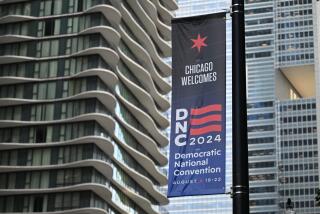Dissidents May Steer UAW Confab on New Course
- Share via
DETROIT — A loose-knit group of dissidents within the United Auto Workers, angered by the union’s increasing cooperation with auto industry management, is considering forming an organized opposition union caucus that would operate independently of the UAW’s current hierarchy.
The dissident group, called New Directions, may use the union’s national convention beginning Sunday at the Anaheim Convention Center as the forum for announcing a more structured opposition inside the UAW--an organization that would have its own staff and even collect dues from willing members.
If New Directions goes ahead with the plan, it would represent the most serious challenge to the authority of the leadership of the million-member industrial union in decades.
New Directions leaders and supporters say they won’t decide until the six-day convention is under way whether to create such an organization. But even without a formal structure, New Directions has already shaken the union to its foundations, forcing a union-wide debate on what direction the UAW and the labor movement in general should take into the 1990s.
Stage Set in Spring Elections
The Anaheim convention, in fact, is likely to become the focal point for that debate and is almost certain to go down as one of the most controversial UAW gatherings in years.
The dissidents, holding perhaps as many as 200 seats in the 2,000-delegate convention, seek to open up a floor debate on a wide range of procedural and philosophical issues that they believe need to be addressed to make the union more responsive to the rank-and-file.
“New Directions will be trying to bring democracy back to our union,” said Victor Reuther, the 77-year-old brother of the UAW’s legendary Walter Reuther and now a supporter of the New Directions group.
The stage for the Anaheim fight was set in regional union elections this spring, when two of New Directions’ leaders, Don Douglas and Jerry Tucker, ran spirited, though unsuccessful, campaigns against the administration of UAW President Owen Bieber and his willingness to cooperate more fully with management on a wide range of shop-floor issues. Douglas and Tucker opposed Bieber’s acceptance of Japanese-style “team concept” agreements and related labor-management programs now in dozens of U.S. auto plants.
In their campaign for positions as regional directors who sit on the UAW’s 22-member governing executive board, Tucker and Douglas exploited the growing frustration among the rank-and-file over such joint programs to mount serious challenges against Bieber-endorsed candidates.
“There is more dissent in the UAW today because there is a lack of leadership in the union on these issues,” said Douglas. “The people are trying to let the administration (of the UAW) know that we’ve got problems.”
UAW leaders and auto executives say that “team” programs are necessary if the U.S. auto industry is to remain competitive with Japanese car makers. But the dissidents respond that such programs undermine the contractual rights of union members and don’t offer any real job security, pointing to instances in which workers have accepted such programs only to be laid off later on.
‘A Lot of Rhetoric’
“Despite these joint programs, the problems we have had are not being addressed,” complained Frank Hammer, president of UAW Local 909 in Warren, Mich., who supports Douglas. “To a lot of the members, this jointness is just a lot of rhetoric, something that is not backed up with any change in the way people are treated.”
In the end, Douglas and Tucker narrowly lost their efforts to win enough delegates to be elected at the convention as regional directors--but not before putting a scare into the UAW leadership. Douglas, a union local president from Pontiac, Mich., won a series of landslides in a number of big General Motors plants in his race for a Detroit-area regional directorship, and only lost after the incumbent, Robert Lent, made a comeback at Chrysler plants where he had spent much of his early union career.
Tucker, who won a court-ordered election for the St. Louis-area directorship last year after a bitter fight with the UAW leadership, lost in his bid for reelection after Bieber mounted a fierce campaign to unseat him. The UAW’s leadership demanded that every staff member of the international union contribute $500 to a campaign fund to defeat Tucker; Roy Wyse, the international’s candidate, eventually won.
But both Douglas and Tucker won enough delegates to the convention, where the actual election of regional directors and other union officers will be held next Wednesday, to form a vocal minority on the convention floor. They will be sure to use that voting power to raise their charges of election fraud against the UAW leadership. New Directions charges that the international union abused its power--and got help from management, in some cases--to defeat Douglas and Tucker.
Although the two dissidents are likely to lose a credentials fight in which they hope to challenge delegates supporting Lent and Wyse, they are almost certain to take their charges to court after the convention.
More to Read
Sign up for Essential California
The most important California stories and recommendations in your inbox every morning.
You may occasionally receive promotional content from the Los Angeles Times.









